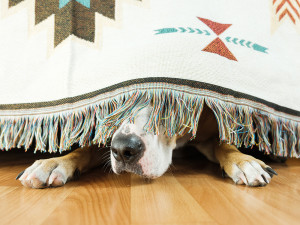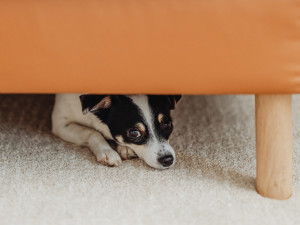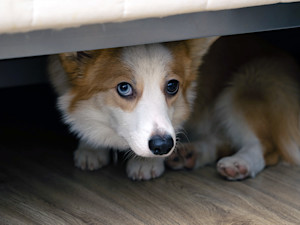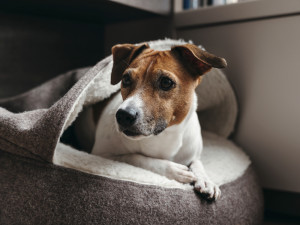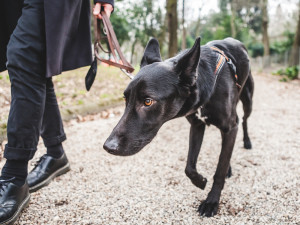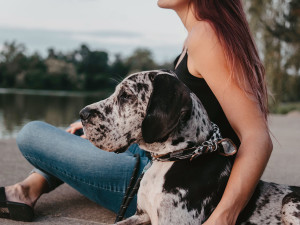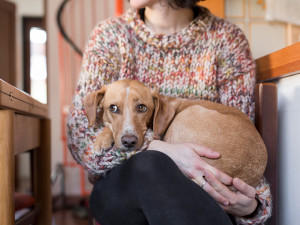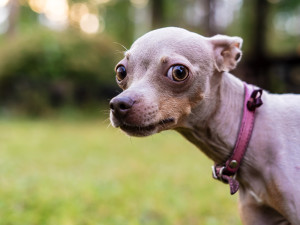5 Surprising Things That Dogs Are Afraid Of
And what to do when they go careening away from the Roomba.
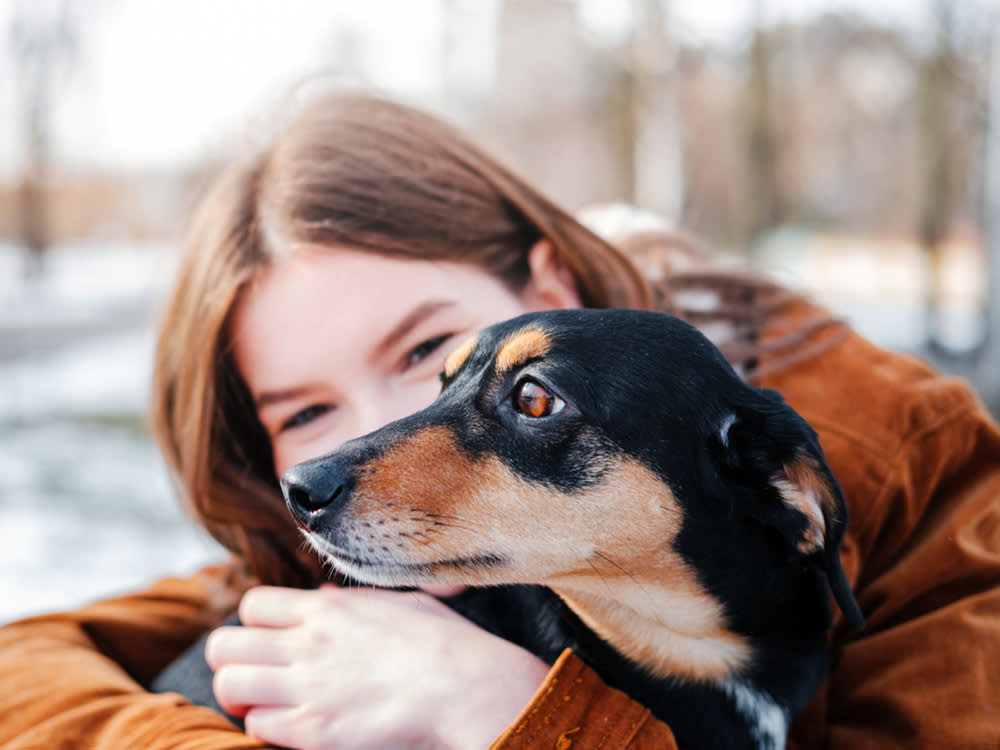
Share Article
As someone with a Pit Bull who would rather hold in her pee for 18 hours than go outside when it’s barely drizzling, I can confirm dogs are mostly big babies. No matter how tough they may seem or present themselves to other pups, I’ve never met a pet parent whose dog didn’t have at least one quirky phobia. Sure, everybody knows that dogs are easily spooked by fireworks, thunderstorms, or a trip to the vet. But for many, those are simply a baseline.
“Dogs, like any animal, have the potential to become afraid of anything,” explains Renee Rhoades, applied animal behaviorist at R+Dogsopens in new tab. While some of these fears can certainly reflect larger behavioral concerns, Rhoades notes that others develop mainly because they’re unfamiliar to the animal.
“Contrary to popular belief, dogs do not become afraid of things simply from negative interactions with them. They can also become afraid of things that they have never encountered before,” she adds.
Just like us, dogs fear the unknown. According to Dr. Anna Kaufman, a veterinarian at Bond Vetopens in new tab, this can include anything from new noises to fresh experiences previously unfamiliar to the pup. Sometimes this might be another animal and other times it’ll be a human invention they’ve yet to encounter. To be clear, none of that is to say more serious or damaging memories can’t have lasting effects as well. “If a dog experienced a trauma, this might cause fear reactions later on,” Dr. Kaufman confirms.

Emotional distress aside, there are plenty of strange things that frighten dogs that are somewhat harmless. And for some of these, the true reason behind the fear isn’t always easy or even possible to pin down. As Dr. Kaufman puts it, “Every dog is unique, and that is why we love them.”
So, we gathered a few experts to see which fears might be as popular as they are peculiar.
Things that scare dogs
Vacuum cleaners
Anyone who has tried the debilitating exercise that is cleaning your home with a canine bystander knows how many pups view vacuum cleaners. Whether it’s the unfamiliarity or volume of the noise vacuums produce, dogs view them as a sign of the end times.
“[Dogs] can be afraid of common items that humans use daily, like the vacuum, but if they are unfamiliar with that item and the sounds they make, it can cause fear,” explains Michelle Bernstein, an animal behavior scientist at VCA Animal Hospitalsopens in new tab. I can personally confirm that some pets are equally opposed to the next evolutionary step in vacuum cleaning: my dog hates my Roomba. To be fair, I do share her fears of AI and the impending robot apocalypse.
Planes
I simplified it to planes, but this really extends to anything human-made and airborne, to be honest. As Leigh Siegfried, the founder and training director of Opportunity Barksopens in new tab, explains, it all comes down to the sounds they make that can terrify dogs. Plus, they have a suspicious astonishment at the miracle of human flight.
“Sometimes, they fear things like helicopters, planes, or hot air balloons, just any unanticipated objects in the sky that might be noisy or making noise,” Siegfried says. Luckily, the opportunities to flyopens in new tab with your dog are growing by the day so hopefully that will help them become more comfortable with the conceptopens in new tab.
Strangers
This one’s slightly more serious and might reflect larger issues that should be handled with guidance from a professional. If ignored, these anxieties will only deepen and snowball into real behavioral concerns. Not to mention, Bernstein notes that this dread can often be coupled with — somewhat ironically — fears of solitude, which will really complicate your pup’s social life. “Dog can be afraid of strangers and being alone which can develop into behavior issues like separation anxiety and aggression,” she says.
Some dogs are particularly afraid of men. While it’s usually due to previous trauma or a lack of socialization, I do understand the hesitation. As someone who has unfortunately dabbled with dating apps, I can confirm the men on those things are absolutely insane. So, I do get why other species would grow weary of the human male gender.
Water
Pet parents know that not every pup likes to — or can — swim. It’s only natural some would have adverse feelings toward taking a dip or seeing water in general, especially when you consider how most react during the bathing process.
But Dr. Kaufman notes that, for some dogs, it’s the things that have seemingly conquered the water that are the scariest to them. “Some dogs don’t like water, some dogs are frightened by balloons or things that float,” she says.
Balls
You’d think the canine population would unanimously support a toy with which they have long been associated, but this is why it’s important not to stereotype. Sure, no one is suggesting that dogs are routinely terrified of tennis balls or any other round device they can fit in their mouths.
But if pups aren’t used to balls being big and bouncy, it can freak them out. “Some dogs are scared of any noise such as a basketball bouncing near them — all depends on the dog,” Dr. Kaufman says.
How to handle quirky fears
Strange as some of these may appear, it’s important to understand that any dog battling one of these fears is enduring real emotional distress. That terror is genuine, no matter how silly the item that’s inspiring it. As a result, pet parents should respond appropriately with care, even if they’re laughing a little through it.
According to Siegfried, your first step when faced with a petrified dog should not be avoidance as appealing as it may seem. “If they have a big reaction to something, don’t let them run away. I know that sounds counterintuitive. But keeping the dog with you, helping them recover, and then moving away together builds resilience to recover,” she explains.
However, that does not mean forcing your dog to do something they’re fearful of. This is not only cruel but will likely make the issue worse. Instead, pet parents should learn how to properly comfort their dogs. Siegfried explains that this often comes down to reassurance, calming your pup and letting them know everything is going to be fine. “It’s like a kid who fell off the monkey bars at a playground and is upset and could benefit from a pickup and a hug,” she says.
What you can do to ease their stress
Rhoades adds that you might have heard the advice that comforting a scared dog will eventually make the anxiety worse. She advises you to ignore this particular counsel; it’s entirely inaccurate. The fact that your pet is looking to you at these times is realistically a great indication of your overall bond.
“What is happening is your dog is feeling comfortable enough to show their distress, so although it may feel that they are getting worse they are actually trusting you to support them,” she says.
Now, there are a few methods to help pups better face their fears. Dr. Kaufman recommends investing in products like thunder shirts or calming collars for longer periods of exposure, as well as talking to your vet about calming medications that can be given prior to stressful events.
Bernstein also advocates for creating a safe space, a place in the home your pup can retreat to where they’ll always feel protected. Then, if necessary, you can slowly introduce them to what they’re afraid of while they feel secure. “Providing them with a safe space to explore and learn about something fearful will help your dog gain trust in you that the fearful thing might be safe, too,” she says. “You want your dog to trust you so they can learn to trust the thing they fear.”
Of course, sometimes what seems like a silly little fear can also be a serious one. Rhoades warns that if your dog is struggling with day-to-day activities, losing sleep, or not eating, they may have a larger issue. Basically, if their behavior has worsened in an area unrelated to the direct fear, you should consider reaching out to a vet or trainer for help.
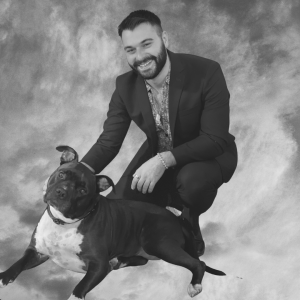
Sean Zucker
Sean Zucker is a writer whose work has been featured in Points In Case, The Daily Drunk, Posty, and WellWell. He has an adopted Pit Bull named Banshee whose work has been featured on the kitchen floor and whose behavioral issues rival his own.
Related articles
![A dog looking timid in his bed]()
How to Help Thunder-Phobic Dogs
Tips for comforting your pup when the storm is too loud for your pup’s comfort.
![Shy black dog walking with owner at the park.]()
How to Help an Anxious Dog Conquer Their Fears
Pro tips for boosting the confidence of a scaredy-cat dog.
![Pet parent comforting anxious dog by holding their paw]()
How to Help an Anxious Dog
Easy ways to calm your pup’s nerves.
![A woman sitting with her arm around a dog enjoying a view of water.]()
How to Cure Your Dog’s Case of the Everyday Scaries
There’s nothing to fear but fear itself — and a dog who won’t stop shaking when it thunders.
![shy dog frightened in the arms of the owner. this brown mixed-breed hound puppy has a sweet gaze. the female owner has a wool sweater]()
Why Is My Dog Shaking? Causes and Treatment
A vet explains why the weather isn’t always to blame.
![Russian Toy Terrier with ears back]()
9 Reasons Why Dogs Put Their Ears Back
Here’s how your dog’s ears can clue you in to how they’re feeling.
